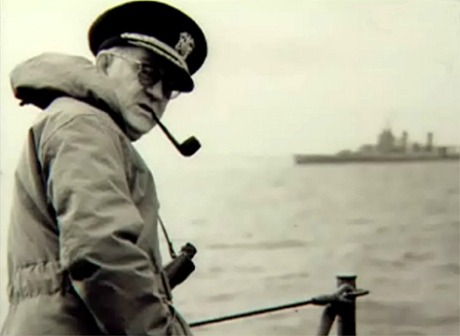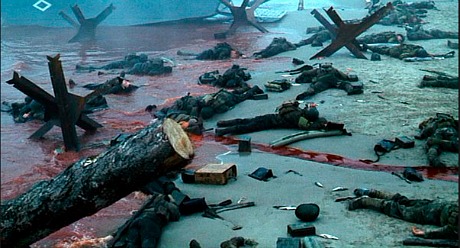Laurent Bouzereau and Mark Harris‘s Five Came Back, a brilliant three-hour doc about the transformative experiences of five name-brand Hollywood directors (John Ford, Frank Capra, William Wyler, George Stevens and John Huston) during World War II, premiered last night on Netflix. Please see it, and if at all possible in a single sitting. Here’s my 3.22 review.

That said, I’m obliged to re-irrigate a dispute between Harris, author of the same-titled 2014 book, and Ford biographer Joseph McBride about the doc’s claim that Ford’s service as a WWII documentarian-propagandist basically ended after he went on a three-day bender following the D-Day invasion.
In a 3.23 HE piece called “Ford’s Bravery, Drinking, Sentimentality,” McBride articulated his dispute with Harris based on Harris’ book vs. what McBride had reported in “Searching for John Ford,” a respected 2001 biography.
But yesterday McBride doubled down and then some after seeing the Netflix series [see below] and taking it all in. I naturally passed his complaint along to Harris. Harris came back this morning with a stern and specific reply [also below].
McBride’s 3.31 letter: Netflix’s Five Came Back is “a stirring tale of human courage and creativity in a time of maximum testing and danger. The storytelling is compelling; the visuals and the editing are stunning. But it makes a false claim that Ford was sent back to the US in punishment after his three-day bender and never was on Navy service again, which is a gross distortion of the final stages of Ford’s war service.
“I responded in detail in your 3.23 column by summarizing Ford’s war record, sometimes in dangerous situations, in France, England, and Yugoslavia until he went back to the US in August 1944 to make They Were Expendable. He had been lobbying for a long time to make that film and discussing it with MGM.
“Harris’s script for Five Came Back contradicts his own book, which reports some of Ford’s post-D-Day exploits in Europe, drawing on my book (including my interview with Admiral Bulkeley, whom Ford accompanied on Bulkeley’s PT boat on missions in France and Yugoslavia after D-Day; I also used Ford’s military records and other sources). So it is odd that he makes this false claim in the documentary.
“After going into some of his post-D-Day exploits, Harris misleadingly writes, “It is not clear why Ford’s time in France ended so abruptly [sic], but his drinking binge, which had tested the patience of an Air Force captain and required the intervention of more than one Navy officer, had been so embarrassingly public that it could have resulted in a dishonorable discharge. No official report of the incident seems to have been made, but Ford may have been urged by his own men or Bill Donovan [head of the OSS] to take himself out of harm’s way and keep a lower profile.”
“Note how Harris does not offer any proof, just conjecture, and how his account is contradicted by the documented facts I report.
“Both Harris’s book and Scott Eyman’s Ford biography also dispute Ford’s account that he went on Omaha Beach on June 6, 1944. They dispute him on that point without offering any contradictory evidence.
“Ford gave a lengthy, highly detailed interview in June 1964 to the American Legion Magazine (Pete Martin, ‘We Shot D-Day on Omaha Beach’) about the D-Day landings in which he
participated, which I quote in my book ‘Searching For John Ford.’ The OSS wrote of Ford, ‘After landing he visited all of his men in their various assignments, and served as a great inspiration by his total disregard of danger in order to get the job done.’
“Harris gave you a disingenuous and false account. The documentary‘s account is ‘fake news.’ It’s a shame that the documentary had to fall down in that one important aspect and malign a man who did so much for his country and humanity during the war.”

Harris’s 4.1. reply: “Joseph McBride’s dispute about the end of Ford’s time in the Navy seems to come down to a single, fairly narrow question: Did one of Hollywood’s most famous blackout alcoholics see his time supervising Navy men come to an abrupt end because of a three-day bender in the week after D-Day, or simply very soon after it? To suggest it was the latter, McBride points to ‘dangerous situations’ in France, England, and Yugoslavia that Ford faced after D-Day but before going home that August, presumably as evidence that the Navy was still deploying him in a meaningful way.
“But this was not the case. Ford appears to have been on Bulkeley’s PT boat only ‘intermittently’ and by Bulkeley’s permission; Ford viewed it as a means to get Bulkeley on board with the idea of being portrayed in the Hollywood movie he wanted to make, They Were Expendable. As for the danger, to quote Bulkeley, there wasn’t ‘much action’ other than some ‘skirmishes’ on the PT boat. Bulkeley also called their trip to Yugoslavia ‘very minor,’ suggesting that Ford probably exaggerated its meaning, and noted that ‘John Ford made a lot of stuff up. Too much for me. I know some of the stuff I heard him talk about was phony.’
“The above information comes from a very reliable account of Ford’s war service by a historian who also notes that ‘Ford’s claim to have been with Bulkeley when the PT boat commander ran agents into and out of occupied France seems to have been false.’ That historian is Mr. McBride; the source is his own Ford biography.
“I stand by the account of Ford’s war service in my book and by its distillation in the documentary, which, yes, says bluntly that after his bender, Ford’s mission was essentially over and he would never oversee Navy men again. As Mr. McBride knows, that is accurate. There is no suggestion, in the Ford papers, in Mr. McBride’s account or anywhere else, that Ford did anything further in his capacity as the head of Field Photo, or was asked to, after D-Day. His time with Bulkeley was not a Navy assignment but an initiative taken by Ford himself in preparation for returning to Hollywood and making a movie.
“On the subject of D-Day, Mr. McBride writes, using Ford’s 1964 American Legion interview (parts of which I cite in my book) as evidence, that Ford biographer Scott Eyman and I both dispute Ford’s account that he himself advanced up Omaha Beach (as opposed to supervising men from the Navy boats just off the shoreline) on June 6, 1944 — an assertion Mr. McBride presumably believes. Ford, an inveterate ornamenter of his war service, gave many different and contradictory accounts of his specific actions on D-Day over the years.
“As with many of those accounts, it is probably best to discard the most grandiose versions and believe Ford when he was speaking at his most restrained — as when he said, of D-Day, ‘In all honesty, I was more or less a logistics officer. It was my job to see that everyone who should have a camera had one.’ That is admirable in itself, and surely requires no enhancement.
“I’m sorry that Mr. McBride used an absurd phrase like ‘fake news’ to characterize an interpretation that I believe is far better supported by the facts than his own. As a historian, he knows better, or he should. In abruptly deciding the time is right to characterize not just the documentary but my book as ‘misleading’ (that is the source of the passage he quotes) he nonetheless offers not a single piece of evidence to contradict it. Now that both my book, which includes extensive source notes, and the documentary are available to be examined by anyone who is curious to know more about this, I will, from this point on, let them speak for themselves.”









